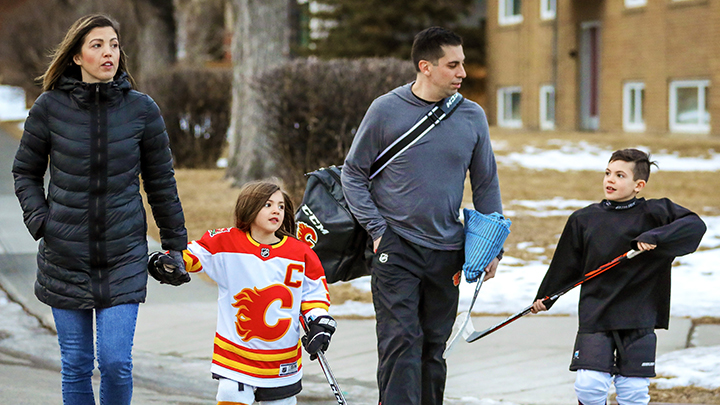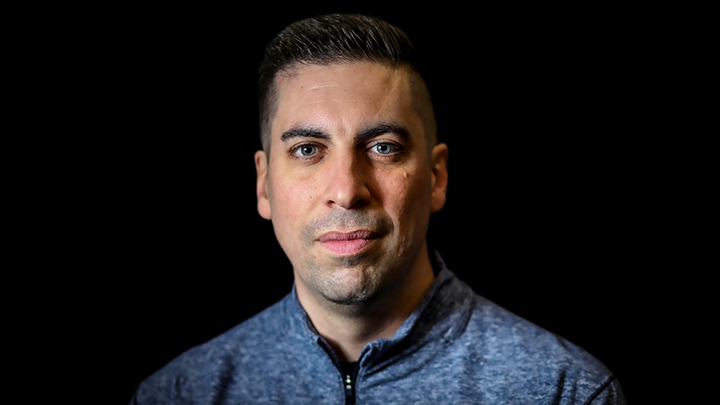
April 11, 2025

Chris Snow, third from left, enjoys time with his family — wife Kelsie and children Willa and Cohen — in 2020. When ALS claimed his life in 2023, his organ donations saved four lives. “Every time I got a message or phone call from (the donor coordinators) saying they had placed one of his organs (with a matching recipient), it was a very beautiful and emotional thing,” says Kelsie. Photo by Leah Hennel.

Chris Snow and son Cohen hit the rink in 2020 for some hockey practice. At the time, he served as the Calgary Flames assistant general manager. Photo by Leah Hennel.

Chris Snow was one of the first in Canada to test a new gene therapy for ALS — just one of the ways in which his contributions continue to make a positive impact to healthcare and the lives of others. Supplied.
Story by Su-Ling Goh | Photos by Leah Hennel
CALGARY — When Chris Snow learned he didn’t have much time left to live, he chose to spend it with his loved ones — and to raising awareness of the disease that was killing him. The former Calgary Flames assistant general manager left a legacy after his death in 2023, including some unexpected gifts of life.
Chris, his wife Kelsie and their baby boy Cohen moved in 2011 from Boston, Massachusetts to Calgary, where Chris spent the rest of his career with the Calgary Flames. The couple welcomed their daughter Willa in 2014. Then in 2019, their world was turned upside down when Chris was diagnosed with familial amyotrophic lateral sclerosis (ALS).
“He was diagnosed (with ALS) and given six to 12 months to live.… He had a very aggressive genetic mutation,” says Kelsie Snow. “It’s a devastating disease to families.”
Of all ALS cases, 10-15 per cent are genetic. Chris had already lost his father, two uncles and one cousin to the fatal neurodegenerative disease. ALS attacks the nerves of the body that send messages from the brain to the muscles, eventually leaving a person unable to move, speak, swallow or breathe.
While all four of his relatives died within nine months of their diagnosis, Chris lived for four more years, thanks to a clinical trial in Toronto. He was one of the first to test a new gene therapy for ALS — just one of the ways in which his contributions continue to make an impact.
“When Chris was diagnosed, we knew we’d have a unique platform to talk about this disease because of his job being with the Flames. We knew the hockey community would rally around us,” adds Kelsie. “We decided at this point, ‘OK, now we need to do something.’”
Kelsie explains her husband chose to share his story with the world on social media, hoping to educate about the devastation of the disease. He raised $575,000 for ALS research — and continued to work full-time in the Flames’ front office — until he died in the fall of 2023. Chris was 42-years-old.
The couple had talked about Chris’ dying wishes, but organ donation was not one of them — only because they had both assumed his ALS would disqualify him as a donor.
“I didn’t think we could donate Chris’ organs,” says Kelsie. “So I will never forget the moment that his doctor in the ICU said now our next steps could be to talk about organ donation. My heart skipped a beat.”
Give Life Alberta medical director Andreas Kramer explains many people, including some healthcare professionals, incorrectly assume a disease that makes someone unwell also makes them ineligible to donate organs and tissues.
“(Sometimes) the reason for (patients) being sick doesn’t have anything to do with dysfunction in their organs,” says Kramer.
“(ALS) is a disease of the central nervous system that doesn’t involve other organ systems. There’s really no reason why (their organs) wouldn’t be healthy, potentially, and why they couldn’t function well in a (transplant) recipient.”
Donation teams evaluate each potential donor on an individual basis. Patients with conditions such as diabetes, some cancers, multiple sclerosis, Parkinson’s disease and ALS have all donated organs.
Kelsie’s decision to donate her husband’s organs was affirmed when the donor coordinators informed her Chris had registered his intent to donate.
“Every time I got a message or phone call from (the donor coordinators) saying they had placed one of his organs (with a matching recipient), it was a very beautiful and emotional thing and it made my kids so… ‘happy’ is a weird word to use around this, but it did (make us happy).”
“(My son said) it felt like part of (his dad) would stay alive. So to be able to have that feeling of deep comfort … knowing that your person will live on.”
Chris donated his lungs, liver and kidneys, saving the lives of four people. The Snows have heard from one of the recipients.
“We did get (an anonymous) card from the woman who got Chris’ lungs, thanking us and saying how life-changing it is for her to be able to just breathe normally. That one for me was super-meaningful. Chris had asthma growing up. He often talked about one of his biggest fears with ALS was not being able to breathe … being able to breathe freely was something Chris never took for granted.
“Chris was so willing to give himself… so the fact that (organ donation) could be the last thing that he did on this earth was, and remains, incredibly profound for us.”
More than 500 people are waiting for life-saving transplants in Alberta. For more information on organ and tissue donation, visit GiveLifeAlberta.ca.